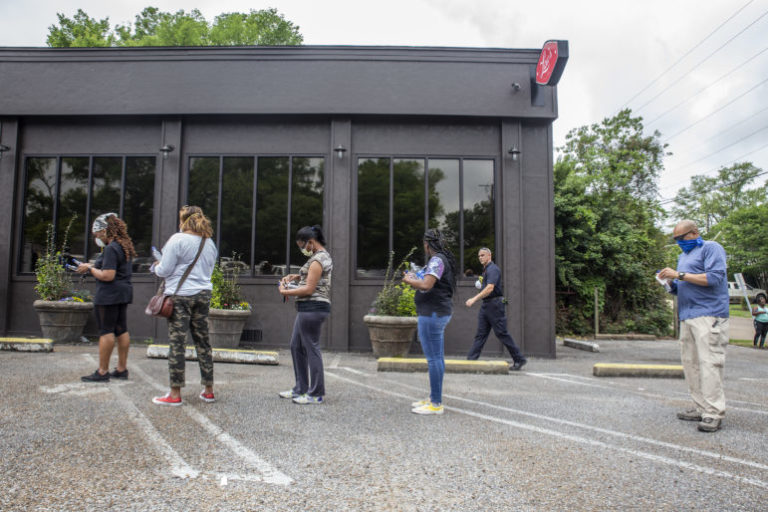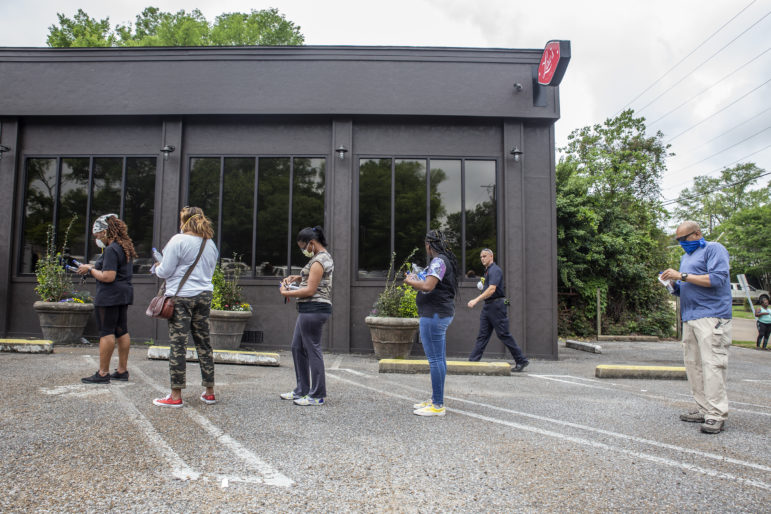

Eric J. Shelton/Mississippi Today, Report For America
People stand six-feet apart as they wait for hand sanitizer at Corner Market in the Westland Plaza on Fortification Street in Jackson, Miss., Wednesday, April 8, 2020. The hand sanitizer was donated by Cathead Distillery.
As millions of dollars begin flowing into Mississippi to aid in the economic recovery following the COVID-19 pandemic, black leaders in the state are demanding officials better involve the black community, which has been hardest hit by the disease.
Gov. Tate Reeves announced April 14 he had created the Governor’s Commission for Economic Recovery, led by political allies and business leaders, to study the impacts of the pandemic and craft solutions as the state prepares to “reopen.”
The commission is chaired by Sanderson Farms CEO Joe Sanderson and the executive team is comprised of five white businessmen who, according to its website, “represent the diverse geographical regions of the state.”
“It baffles me how you could not have black Mississippians, who are directly on the front lines of this crisis and who face these day-to-day impacts, as part of the conversation about recovery. It’s unacceptable,” Corey Wiggins, executive director of the Mississippi NAACP, told Mississippi Today.
In a letter to State Health Officer Thomas Dobbs dated April 14, a coalition of black leaders also demanded that the state increase black representation in its response teams; greater invest in COVID-19 interventions and solutions for disadvantaged communities; target messaging to the black community; expand testing and release more data about COVID-19 cases and testing.
“Recognize that the circumstances affecting vulnerable populations are multilayered,” the letter asks.
The Mississippi State Health Department began releasing statistics April 8 that show Mississippi is no exception to the national trend of the virus’ devastating affect on black residents. Despite representing less than 40 percent of the state’s population, black people made up 56 percent of COVID-19 cases and 63 percent of the related deaths by April 19. Mississippi has reported race “unknown” for a very small percentage of cases, whereas a whopping 65 percent of cases reported nationally to the Centers for Disease Control and Prevention by April 19 did not specify race.
Before COVID-19 hit Mississippi and under Dobbs’ new leadership, the health department had already begun building back its Health Equity division, led by Victor Sutton. “He has put his money where his mouth is,” Sutton said of Dobbs.
Sutton said the health department has conducted much outreach in the black community surrounding COVID-19 education and has worked with historically black colleges and over 90 faith based leaders. “My wife got a text from the church that Jackson State has testing this weekend,” Sutton said Friday. “I think that is a piece that can’t be overlooked and can’t be missed as we talk about really reaching the community.”
In a state where 31 percent of black people live in poverty compared to 12 percent of white folks, and the unemployment rate is almost three times as high for black workers, economic opportunity plays a role in the state’s overall unequal health outcomes.
“You have to be kind of intentional if you really want address those issues,” said Rep. Jarvis Dortch, D-Raymond.
Mississippi is expected to receive at least $1.25 billion from the federal government to help the state recover from the pandemic’s economic damage, including the more than 130,000 people who have filed for unemployment since Mississippi’s first COVID-19 case. Dortch argued that elected officials, as opposed to just business leaders, should have a say in how to prioritize the funding.
“People in our districts elected us … If I get on there and I’m only thinking about how to help the business community, my constituents are going to know. They’re going to vote against me,” Dortch said. “Joe Sanderson isn’t responsible to anybody but himself.”
Reeves’ staff has not responded to requests for interviews about the administration’s plan to tackle the underlying causes of health disparities in the state’s black community.
“We need Mississippians helping Mississippians,” Reeves said in a press release. “I have asked a trusted group of our state’s top business minds to do just that. Under the ‘Restart Mississippi’ umbrella, they are going to develop a series of recommendations and goals for our new economy. They will study the impact of COVID-19 on our workforce and small businesses. And they will help us recover — day by day.”
Reeves addressed the commission’s lack of worker representation at his Friday press conference, saying, “We don’t need union bosses to tell us how to take care of our people. We never have and we never will.”
Without black representation on the state’s COVID-19 related task forces, advocates worry the virus’ disproportionate affect on black folks will be minimized to that community’s higher rates of comorbidities, such as diabetes and hypertension, without addressing the root causes.
By focusing solely on the health conditions that put people at greater risk, “it’s almost like they’re putting the blame back on the victim and not really leading with, let’s be really honest about the structure of racism that exists in this country and in our state — how we haven’t started out equally and the resources are not equal,” said Cassandra Welchlin, co-founder and director of the Mississippi Women’s Economic Security Initiative.
Researchers recognize that black Americans are at greater risk of catching and dying from COVID-19 for the same underlying reasons they have higher rates of other diseases. The disparities stem from poverty and wealth inequity, residential segregation, underfunded education and systemic racism and racial bias.
While higher rates of poverty and lower education levels make black communities more susceptible, these social determinants of health cannot fully explain the gap in health outcomes between black and white Americans. The disparities are driven also by racial bias in the health care system and higher level of stress in the black community.
“Income and education is a driver of health in the United States regardless of your race. But race matters for health even after you take income and education into account,” said David Williams, Ph.D., professor of public health Harvard T.H. Chan School of Public Health and professor of African and African American Studies and of Sociology at Harvard University. “We have research that documents the racism in our society, the interpersonal discrimination and other mechanisms of racism matter for health.”
The letter to Dobbs urges the state to consider “healthcare quality, access to timely testing and treatment or biases in care that Black people may have faced.”
“There has also been little recognition of the prolonged exposure essential workers and community members faced as the response to the pandemic evolved in our state,” the letter reads.
The authors are also asking for the health department to release more comprehensive data on COVID-19 cases, such as employment and geographic information, so organizers know which populations to target with information and support.
Organizers could be passing out face masks at Wendy’s, for example, without knowing if fast food workers are really the most at-risk population, said Nakeitra Burse, a local public health consultant.
“This is a defining moment for the world,” Burse said. “Will we do things the way we’ve normally done or will we address the root cause and create more equitable systems and strategies?”
The post As Covid-19 rips through black communities, African American leaders demand inclusion on response teams appeared first on Mississippi Today.
- In trial of ex-wrestler, Mississippi’s former welfare director testifies about appeasing politicians, trying ‘my very best’ - February 23, 2026
- It’s early, yes, but Mississippi’s college baseball teams have started fast - February 23, 2026
- Mississippi House wants to increase public school oversight - February 23, 2026